

To boost your self-esteem, write about chapters of your life. In truth, so much of what happens to us in life is random – we are pawns at the mercy of Lady Luck.
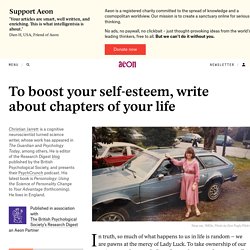
To take ownership of our experiences and exert a feeling of control over our future, we tell stories about ourselves that weave meaning and continuity into our personal identity. Writing in the 1950s, the psychologist Erik Erikson put it this way: To be adult means among other things to see one’s own life in continuous perspective, both in retrospect and in prospect … to selectively reconstruct his past in such a way that, step for step, it seems to have planned him, or better, he seems to have planned it.
Bicameralism (psychology) Jaynes uses governmental bicameralism as a metaphor to describe a mental state in which the experiences and memories of the right hemisphere of the brain are transmitted to the left hemisphere via auditory hallucinations.
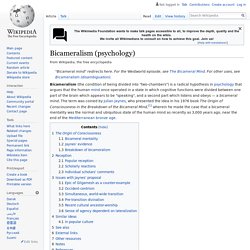
The metaphor is based on the idea of lateralization of brain function although each half of a normal human brain is constantly communicating with the other through the corpus callosum. The metaphor is not meant to imply that the two halves of the bicameral brain were "cut off" from each other but that the bicameral mind was experienced as a different, non-conscious mental schema wherein volition in the face of novel stimuli was mediated through a linguistic control mechanism and experienced as auditory verbal hallucination.
Bicameral mentality would be non-conscious in its inability to reason and articulate about mental contents through meta-reflection, reacting without explicitly realizing and without the meta-reflective ability to give an account of why one did so. 8 Negative Attitudes of Chronically Unhappy People. The science of stress and how our emotions affect our susceptibility to burnout and disease, Aldous Huxley on how to get out of your own light & more. Hello, Peggy Fleming!
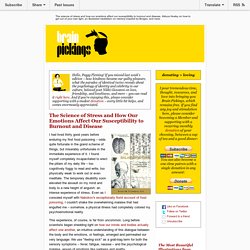
If you missed last week's edition – how kindness became our guilty pleasure, what the paradox of identical twins reveals about the psychology of identity and celebrity in our culture, beloved poet Nikki Giovanni on love, friendship, and loneliness, and more – you can read it right here. And if you're enjoying this, please consider supporting with a modest donation – every little bit helps, and comes enormously appreciated. The Science of Stress and How Our Emotions Affect Our Susceptibility to Burnout and Disease. Being Defensive. The Battle for Your Mind: Brainwashing Techniques. Authoritarian followers Mind Control Subliminals By Dick Sutphen Summary of Contents The Birth of Conversion The Three Brain Phases How Revivalist Preachers Work Voice Roll Technique Six Conversion Techniques 1. keeping agreements 2.physical and mental fatigue 3. increase the tension 4.
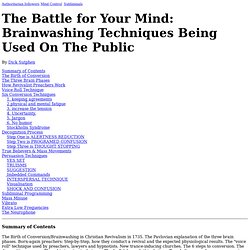
Uncertainty. 5. Jargon 6. No humor Stockholm SyndromeDecognition Process Step One is ALERTNESS REDUCTION Step Two is PROGRAMED CONFUSION Step Three is THOUGHT STOPPINGTrue Believers & Mass Movements Persuasion Techniques YES SET TRUISMS SUGGESTION Imbedded Commands INTERSPERSAL TECHNIQUE Visualisation SHOCK AND CONFUSIONSubliminal Programming Mass Misuse Vibrato Extra Low Frequencies The Neurophone Summary of Contents. What Is Character? Debunking the Myth of Fixed Personality. Sonja Lyubomirsky. Sonja Lyubomirsky is a professor in the Department of Psychology at the University of California, Riverside and author of The How of Happiness, a book of strategies backed by scientific research that can be used to increase happiness.[1]

This creepy psychological technique will sabotage anyone's self-esteem. The Image That Can Break Your Brain. "Attentional blink" causes you to forget what's in front of your eyes. 1276_Being_Defensive.png (PNG Image, 1276 × 2734 pixels) 5 examples of how the languages we speak can affect the way we think. Keith Chen (TED Talk: Could your language affect your ability to save money?)
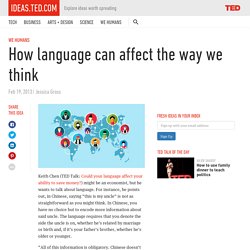
Might be an economist, but he wants to talk about language. For instance, he points out, in Chinese, saying “this is my uncle” is not as straightforward as you might think. In Chinese, you have no choice but to encode more information about said uncle. The language requires that you denote the side the uncle is on, whether he’s related by marriage or birth and, if it’s your father’s brother, whether he’s older or younger. The word game that reveals peoples' anxiety and depression. Using the new Positive Psychology. The theory in Authentic Happiness is that happiness could be analyzed into three different elements that we choose for their own sakes: positive emotion, engagement, and meaning.
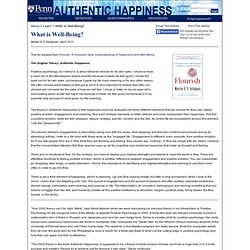
And each of these elements is better defined and more measurable than happiness. The first is positive emotion; what we feel: pleasure, rapture, ecstasy, warmth, comfort, and the like. An entire life led successfully around this element, I call the “pleasant life.” These 8 Psychological Facts Will Help You Understand A Lot More About Life. #5 Is A Game Changer. Psychology is a powerful thing.
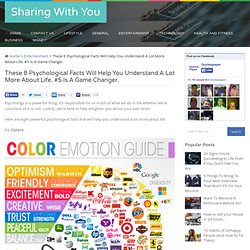
It’s responsible for so much of what we do in life whether we’re conscious of it or not. Luckily, we’re here to help enlighten you about your own brain. Here are eight powerful psychological facts that will help you understand a lot more about life. Interesting Psychology Articles. Interesting Psychology Articles.

There Are Two Kinds of People In The World: Those Who Think There Are Two Kinds of People In The World and Those Who Don’t. This page is dedicated to Robert Benchley’s Law of Distinction, namely, that “There are two kinds of people in the world, those who believe there are two kinds of people in the world and those who don’t.”
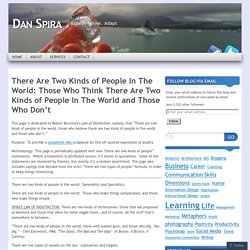
Purpose: To provide a completist-like scrapbook for this oft-quoted expression of duality. Methodology: This page is periodically updated with new “there are two kinds of people” statements. Where a statement is attributed source, it’s shown in quotations. What It's Like on the Autism Spectrum - James Hamblin. Intense stories of family with autism spectrum disorder, as submitted by Atlantic readers barockschloss/flickr In our print magazine this month, Hanna Rosin tells the story of her son Jacob's diagnosis with Asperger syndrome, in the context of the psychiatric community's recent change in the definition of the disorder to part of what's now known as autism spectrum disorder.
We received a lot of thoughtful responses from readers who have experience with the disorder in their own lives, themselves or their families, about how the diagnosis has affected them, and what the changes in definition mean to everyone. Here are excerpts from some of those stories. I remember starting home-based behavioral therapy and that three months after beginning his sessions, Elliott went from speaking approximately 10 words to testing in the low-average range for speech.
—Kammy Kramer; Eagan, Minnesota, USA Sean and I went to Chick-fil-A for lunch. That night as Sean slept, I climbed into bed with him. Why we should rethink what we've been told about consciousness. Consciousness is one of the great mysteries of science – perhaps the greatest mystery. We all know we have it, when we think, when we dream, when we savour tastes and aromas, when we hear a great symphony, when we fall in love: it is surely the most intimate, the most sapient, the most personal part of ourselves.
Yet no one can claim to have understood and explained it completely. There’s no doubt it’s associated with the brain in some way but the nature of that association is far from clear. How do these three pounds of material stuff inside our skulls allow us to have experiences? David Chalmers, a professor at the Australian National University, has dubbed this the “hard problem” of consciousness; but many scientists, particularly those who are philosophically inclined to believe that all phenomena can be reduced to material interactions, deny that any problem exists. Uncanny valley. In an experiment involving the human lookalike robot Repliee Q2 (pictured above), the uncovered robotic structure underneath Repliee, and the actual human who was the model for Repliee, the human lookalike triggered the highest level of mirror neuron activity.[1] Etymology[edit] The concept was identified by the robotics professor Masahiro Mori as Bukimi no Tani Genshō (不気味の谷現象) in 1970.[5][6] The term "uncanny valley" first appeared in the 1978 book Robots: Fact, Fiction, and Prediction, written by Jasia Reichardt.[7] The hypothesis has been linked to Ernst Jentsch's concept of the "uncanny" identified in a 1906 essay "On the Psychology of the Uncanny".[8][9][10] Jentsch's conception was elaborated by Sigmund Freud in a 1919 essay entitled "The Uncanny" ("Das Unheimliche").[11] Hypothesis[edit] This area of repulsive response aroused by a robot with appearance and motion between a "barely human" and "fully human" entity is called the uncanny valley.
Theoretical basis[edit] Mate selection. How consciousness works – Michael Graziano. Scientific talks can get a little dry, so I try to mix it up. I take out my giant hairy orangutan puppet, do some ventriloquism and quickly become entangled in an argument.